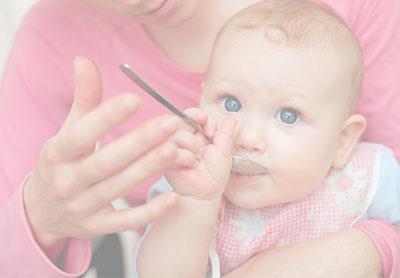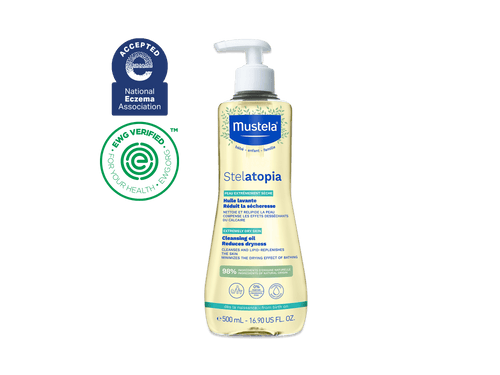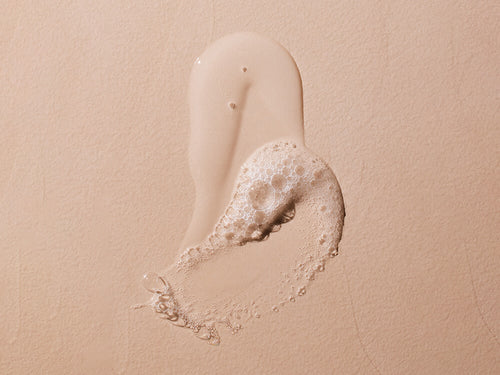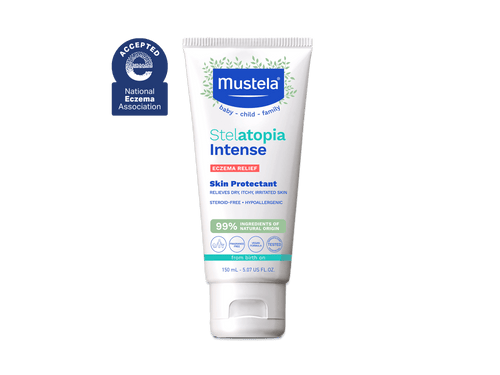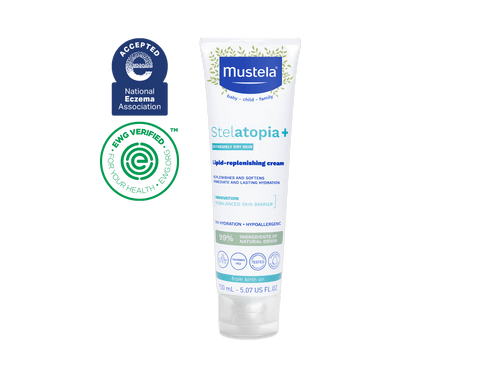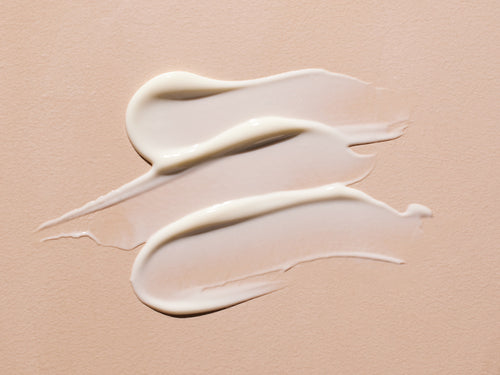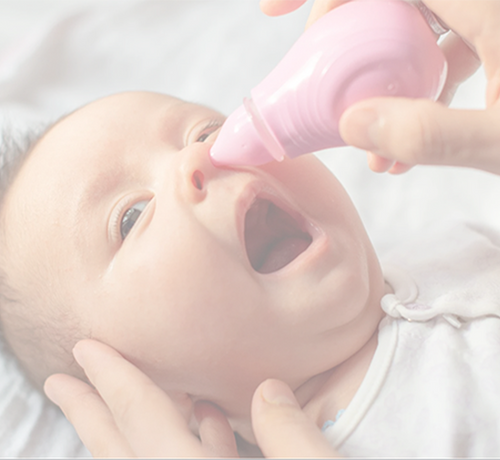Trying to figure out what is triggering your baby’s eczema flare-ups can be a tricky thing. It could be something as obvious as the scratchy blanket in their crib. On the other hand, it could be something considerably less obvious like dust or even the food they come in contact with.
If you’ve taken steps to remove potential triggers from your baby’s environment but they are still suffering from flare-ups, the problem could be food related. Eczema and food allergies are not automatically linked, so diagnosing the specific food that is responsible for a flare-up can be difficult, if not impossible. Additionally, how can you tell if your baby is allergic to specific foods? And what should you do if you suspect that your baby’s eczema is caused by food? Mustela’s experts will answer those questions and tell you everything you need to know about food and your baby’s eczema.
The Connection Between Eczema And Food
The connection between food allergies and eczema can be tricky and confusing. A July 2013 study published in the Journal of Investigative Dermatology reported that infants with eczema had a higher risk of developing food allergies. That said, while there is an increased association of food allergies in children with eczema, the overwhelming majority of children with eczema do not have food allergies.
So just because your baby’s eczema flares-up after a certain meal, it doesn’t mean that it was due to a food allergy. To help you better understand the connection between food and eczema, let’s examine the ways that food can affect your baby’s skin and body.
Food & Your Baby’s Body
At the most basic, there are only two ways that food can have an impact on your baby’s body:
- Through direct food-to-skin contact.
- Through ingestion (eating the food).
The interesting thing about each of these is that only one is likely to cause a localized eczema flare-up, while the other can cause a more system-wide reaction. We’ll explain both individually so you can see the distinction.
Food-To-Skin Contact

Food-to-skin contact is especially common in young babies who are just learning to feed themselves. We’ve all let our baby feed themselves only to have them smear food onto every corner of their skin. No doubt you’ve got the pictures to prove it. We do too.
If your baby suffers from eczema, it is this type contact that will often lead to a flare-up. That’s because eczema is caused by weakening of the skin’s protective barrier (the hydrolipidic layer) that allows dust, pollen, animal dander, and other allergens to irritate the skin. When this type of irritation occurs, the immune system responds by producing red, itchy, swollen skin at the point of contact. It’s similar to the runny nose and itchy eyes you get during the spring.
The bad thing is that allergens can take many forms, and the food your baby eats may be one of them. This doesn’t necessarily mean that your baby has a food allergy per se. It just means that when your baby touches the food and gets it all over themselves, something on the surface of the food is irritating their skin.
Take tomatoes, and tomato products, for example. If you’ve ever fed your child spaghetti with marinara sauce, you may have noticed redness around their mouth afterward. And if they fed themselves, the redness can extend to their cheeks and hands as well. In eczema-prone skin, this can even trigger a flare-up in these locations. That’s because tomatoes are more acidic than most foods. When that acid comes into contact with your baby’s skin, it can cause irritation, redness, and swelling. This is true even in children who don’t have eczema. So just imagine what it can do to the tender skin of a child who does.
Again, an eczema flare-up caused by food-to-skin contact doesn’t necessarily mean that your baby has a food allergy. It’s just that their sensitive skin reacts to something on, or in, the food itself. An easy way to tell if it’s something in the food that is causing the flare-up is to examine where the redness occurs. If the swollen skin is isolated to around the mouth and perhaps on the hands (if you let them feed themselves), skin-to-food contact is probably responsible.
Ingestion

Ingestion is where the true food allergies present themselves. Thankfully, depending on how you look at it, true food allergies often present themselves differently than the skin-to-food contact we discussed above.
True food allergies produce symptoms such as:
- Wheezing or difficulty breathing.
- A drop in blood pressure.
- Vomiting.
- Diarrhea.
- Stomach cramps.
- Swelling or itching of the mouth and throat.
In general, food allergies result in much more serious symptoms than an eczema flare-up. That’s not to downplay the irritation your baby feels when their skin is itchy and tender, but when the alternative is a trip to the emergency room because their throat is swelling closed, you can see why we label the food allergy the way we do. Common foods that cause allergic reactions include peanuts, fish, eggs, wheat, milk, and soy.
Unfortunately, sometimes true food allergies (those caused when your baby ingest a food they are allergic to) can also cause eczema flare-ups. That’s what makes it so difficult to diagnose a simple contact flare-up from an ingestion flare-up. The thing about ingestion flare-ups is that they are usually more widespread than contact flare-ups. Depending on your child’s age, common flare-up sites include behind the ears, behind the knees, wrists, and belly.
So what should you do if you suspect your child’s eczema might be caused by either a contact reaction or an ingestion reaction (food allergy)?
Treat The Eczema And Visit A Doctor
When your child is dealing with an eczema flare-up, the best thing you can do is treat the symptoms with an emollient product like Mustela’s Stelatopia Emollient Cream, Stelatopia Emollient Face Cream, or Emollient Balm. The soothing formula found in Mustela products can reduce irritation by up to 95%. Best of all, Mustela’s emollient products can help your child’s skin begin to make its own protective layer again. This is good news for you and your baby.
Expert tip: for added protection and relief, dress your little one in Mustela's Stelatopia Skin Soothing Pajamas before bed. Made with natural ingredients, these pajamas deliver soothing moisture to your baby's skin all night. This results in less scratching and faster healing.
We recommend treating a flare-up until it goes away, or for a week, whichever comes first. Then, if you still think your child’s eczema may be caused by food, visit a doctor to find out for sure. Your family doctor will refer you to a dermatologist or an allergist who will test your baby’s skin to determine exactly what they are allergic to. These tests will reveal if your baby has an allergy or not. Armed with that knowledge, you can take steps to prevent eczema flare-ups from happening again.


